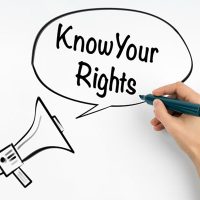Your Rights Under The Sixth Amendment

Every provocateur, if challenged, will invoke the First Amendment, and you can find bumper stickers alluding to the Second Amendment on cars on almost every road and in almost every parking lot in Florida, but then there are the Constitutional amendments that people usually do not think about unless they are facing criminal charges. The state has dropped criminal charges against defendants, and juries have returned verdicts of not guilty when the defendants convincingly argued that the Fourth Amendment prohibited the police from finding or seizing the items that the prosecution was using as evidence against the defendant. Likewise, the Fifth Amendment protection against self-incrimination has stopped an untold number of criminal charges from materializing at all. If you are accused of a crime and you plead not guilty, though, the Sixth Amendment could be the most important amendment of all, since it grants defendants certain rights applicable to various aspects of criminal trials. To find out more about your Sixth Amendment rights and other legal rights, contact a Tampa criminal defense lawyer.
How the Sixth Amendment Affects Criminal Cases
The rights of defendants in criminal cases are outlined in the Constitution and its amendments, as well as in subsequent court decisions. The Sixth Amendment refers to the following rights:
- A speedy and public trial – The Sixth Amendment does not say how soon after your not guilty plea the trial has to happen, but legal remedies are available to defendants if the state delays the trial unnecessarily. The trial should be public unless the defendant requests a private trial.
- An impartial jury – The defendant’s lawyer has the right to participate in the juror selection process. Both sides can eliminate jurors due to the jurors’ bias about the case, including but not limited to having seen media coverage of the case. You cannot eliminate a juror on the basis of the juror’s race or sex.
- Notice of charges – The court must hold an arraignment, where the judge reads the charges out loud to the defendant. Defendants have the right to know which charges they are defending themselves against.
- Witnesses – Defendants can summon witnesses to testify at the trial, including but not limited to eyewitnesses and expert witnesses. The prosecutor and the defense lawyer can question each other’s witnesses during cross-examination.
- Representation by a lawyer – You have the right to have a criminal defense lawyer represent you. The court will appoint a public defender for you if you cannot afford to pay a lawyer. If you wish to represent yourself instead of having a professional lawyer represent you, then you may request this from the court.
Knowing your rights is just the beginning. A criminal defense lawyer can help you protect yourself against unfair treatment during or after your criminal case.
Contact Tampa Criminal Defense Attorney Bryant Scriven
A criminal defense lawyer can help you exercise your rights at all stages of your case, whether or not you go to trial. Contact Scriven Law in Tampa, Florida to schedule a consultation.
